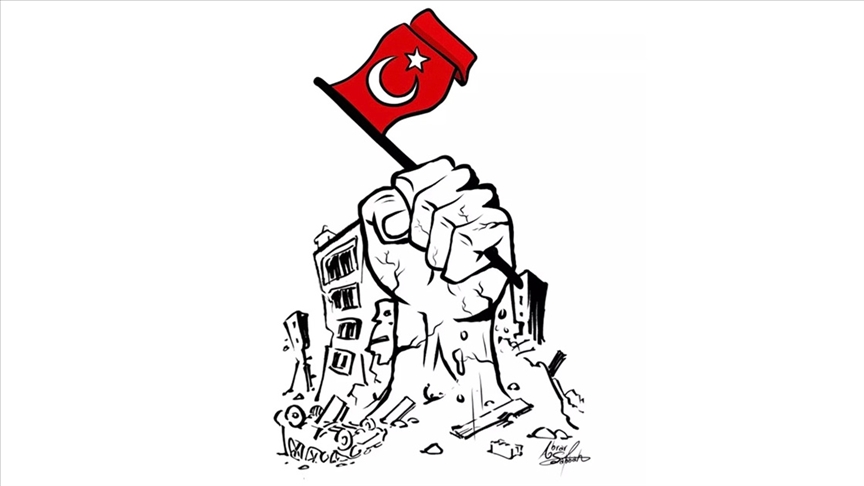In the Holy Quran, Allah, glory unto
Him, vows by the Prophet’s (pbuh) life. Mentioning his great name next
to His Own, the Almighty has required belief in his prophethood, as a
precondition of being a worthy servant. Allah took offense in others
raising their voices in the presence of His Beloved (pbuh), cautioning
against calling out his name like any other. What’s more, the Almighty
has stated that He and the angels send their numerous blessings, salawat’us-sharifah, to the Prophet (pbuh), ordering his ummah amply do the same.
In accordance with the ayah:
“Allah and His angels send blessings on
the Prophet: O Believers! Send your blessings on him and salute him with
all respect,” (al-Ahzab, 56) sen
ding salawat’us-sharifah to that Great Being is a duty for all Believers, laid down by Allah, glory unto Him.
Narrating the following is Ubayy ibn Kab (r.a):
“A third of the night had passed when the Messenger of Allah awoke from his sleep and said:
‘Remember Allah, people, remember
Allah! Blown will be the first horn that will rattle the ground. Then
will follow the second. Death will arrive with all its intensity; death
will arrive with all its intensity…’
‘I send lots of salawat’us-sharifah, Messenger of Allah’, said I. ‘How often should I do it?’
‘As much as you wish’ he replied.
‘Would it be right if I spared a quarter of my prayer for it?’ I again inquired.
‘Spare as much from it as you wish’, he advised. ‘But it will be better for you if you spared more.’
‘Then I will spare half’, I proposed.
‘As you wish…But better if you spared more’, said he.
‘How about I spared two-thirds then?’
‘As you wish… But better if you spared more’.
‘How would it be then if I send salawat’us-sharifah in the entire time I spare for prayer?’ I then asked.
‘If you do’, the Messenger of Allah (pbuh) replied, ‘then Allah will rid you of all your troubles and forgive your sins.’” (Tirmidhi, Qiyamat, 23/2457)
Devotees of the Prophet (pbuh), therefore, embrace the salawat’us-sharifah
as a continuous chant, for they are means of increasing the love of the
Prophet in a Believer’s heart. Appropriately following the Blessed
Messenger (pbuh) and making the most of the quintessential example he
has provided doubtless comes through a grasp of the reality of the Quran
and Sunnah, which in turn is possible only by virtue of drawing closer
to the exemplary morals of the Prophet (pbuh), and delving into the
depths of his heart.
No mortal has succeeded in describing
his essential attribute; his towering morals and disposition has eluded
comprehension. The wise, those spiritual sultans, even the great Jibril,
have all accepted being on his path as the greatest honor, begging by
his door as the most indefinable bliss.
On another note, according to the
manners of prayer advised by Islam, all prayers begin and end with
thanking Allah, glory unto Him, and sending blessings to the Blessed
Prophet (pbuh). There is an established conviction that Allah, glory
unto Him, never turns down a salawat’us-sharifah, which, in
essence, is a prayer and plea to the Almighty; the precise reason as to
why prayers are adorned with it, both in the start and in the end. That
is to say, squeezing in personal prayers amid two, whose acceptances are
highly expected, is to ensure their acceptance as well.
“A prayer is left hanging between the
earth and the skies,” states Omar (r.a) “and is not raised to Allah
until blessings are sent to the Messenger of Allah (pbuh).” (Tirmidhi,
Witr, 21/486)
Indeed, the Noble Prophet (pbuh) one day
happened to see a man who, after salat, was praying without expressing
thanks to Allah, glory unto Him, and sending blessings to His Messenger.
“The man rushed it”, the Prophet (pbuh) then remarked, before calling him over to give advice:
“Upon wishing to make a prayer, one
should first thank and praise Allah and send blessings to His
Prophet…and then afterward continue in whichever manner desired.” (Tirmidhi, Da’awat, 64/3477)
The importance in prayers of resorting to tawassul, submitting the Prophet’s name (pbuh) as a means, reverberates in the following incident recounted by Ibn Abbas (r.a):
“There was an ongoing war between the
Jews of Khaybar and the tribe of Ghatafan, where the Jews were always
routed. In the end they prayed:
‘Lord…we ask for victory in the name of
the Unlettered Prophet whose appearance in the Final Epoch you have
avowed’, after which they defeated Ghatafan. Yet, once Allah, glory unto
Him, did make appear the Messenger of Allah (pbuh) whose name they
appealed in their prayer, the Jews rejected his prophethood and the book
revealed to him; whereupon Allah proclaimed:
‘And when there came to them a Book from
Allah verifying that which they have, and aforetime they used to pray
for victory against those who disbelieve, but when there came to them
(Prophet) that which they did not recognize, they disbelieved in him; so
Allah’s curse is on the unbelievers.’” (al-Baqara, 89)(Qurtubi, II, 27;
Wahidi, p. 31)
Evident is thus the fact even
non-Believers were able to make use of the mercy and abundance that
permeated the universe with the coming of the Prophet of Mercy (pbuh),
owing to his splendid honor in Divine Sight.
Addressing the Prophet (pbuh), Allah assures:
“But Allah will not punish them while you are with them, nor will He punish them while they seek forgiveness.” (al-Anfal, 33)
This Divine assurance was also revealed
with regard to non-Believers. Since even they are given such a
privilege, simply owing to their physical proximity to the Blessed
Prophet (pbuh), the blessings awaiting Believers is simply
inconceivable; especially provided they not only affirm faith in the
Exceptional Being, but moreover receive a share of his love as the core
of their faith. Words, here, are powerless…Beyond a shadow of a doubt,
the extent of happiness in the world and the greatness of ranks in the
Hereafter are to the degree of depth a Believer lets his heart immerse
in the love of the Prophet (pbuh).
Therefore do not forget sending your
blessings and peace to him…for you too stand in need of his intercession
in the darkest of hours!










No comments:
Post a Comment